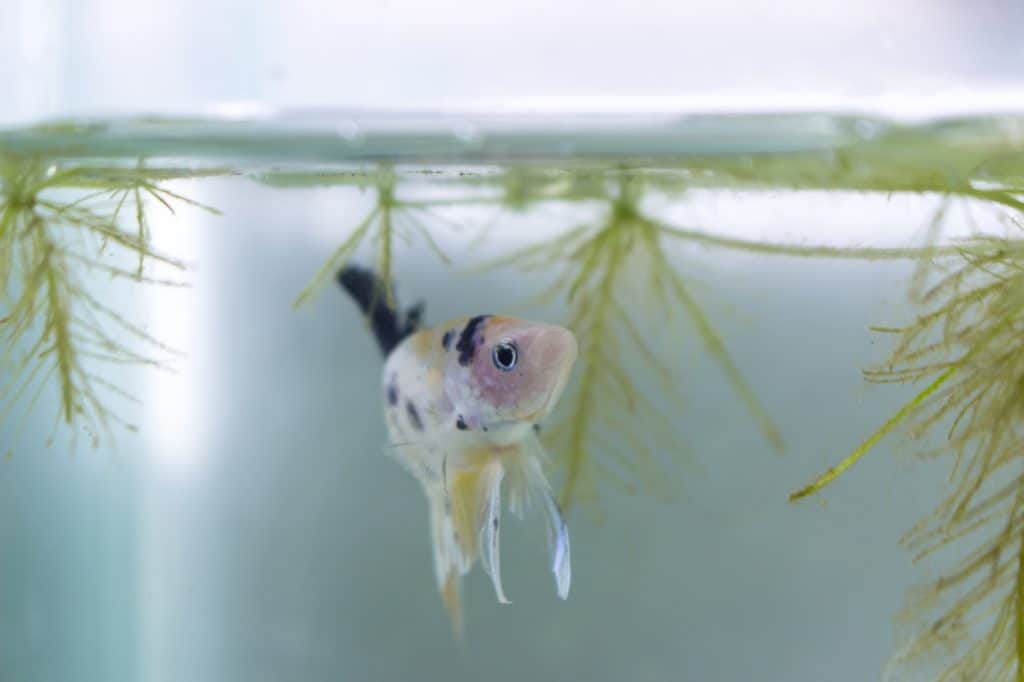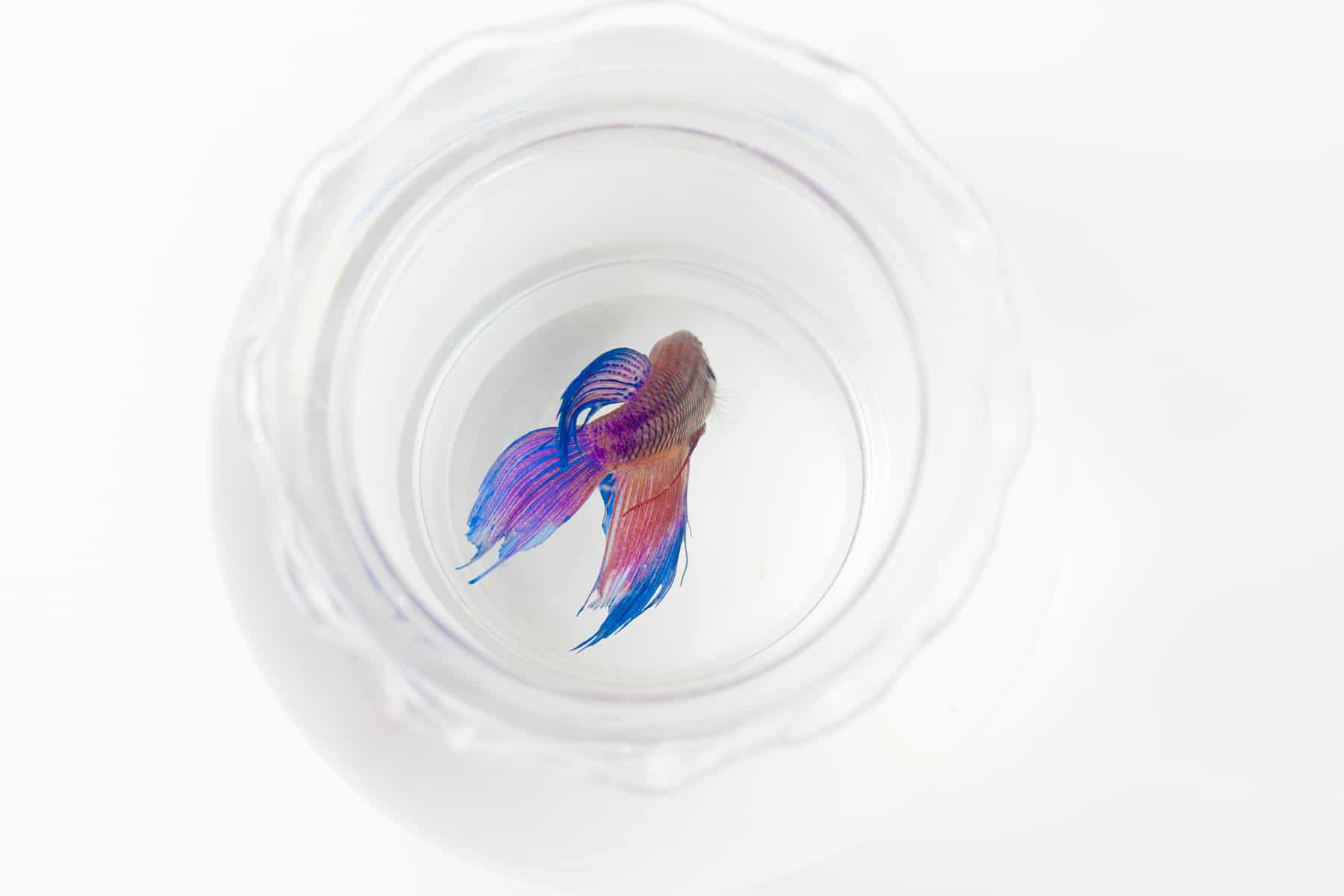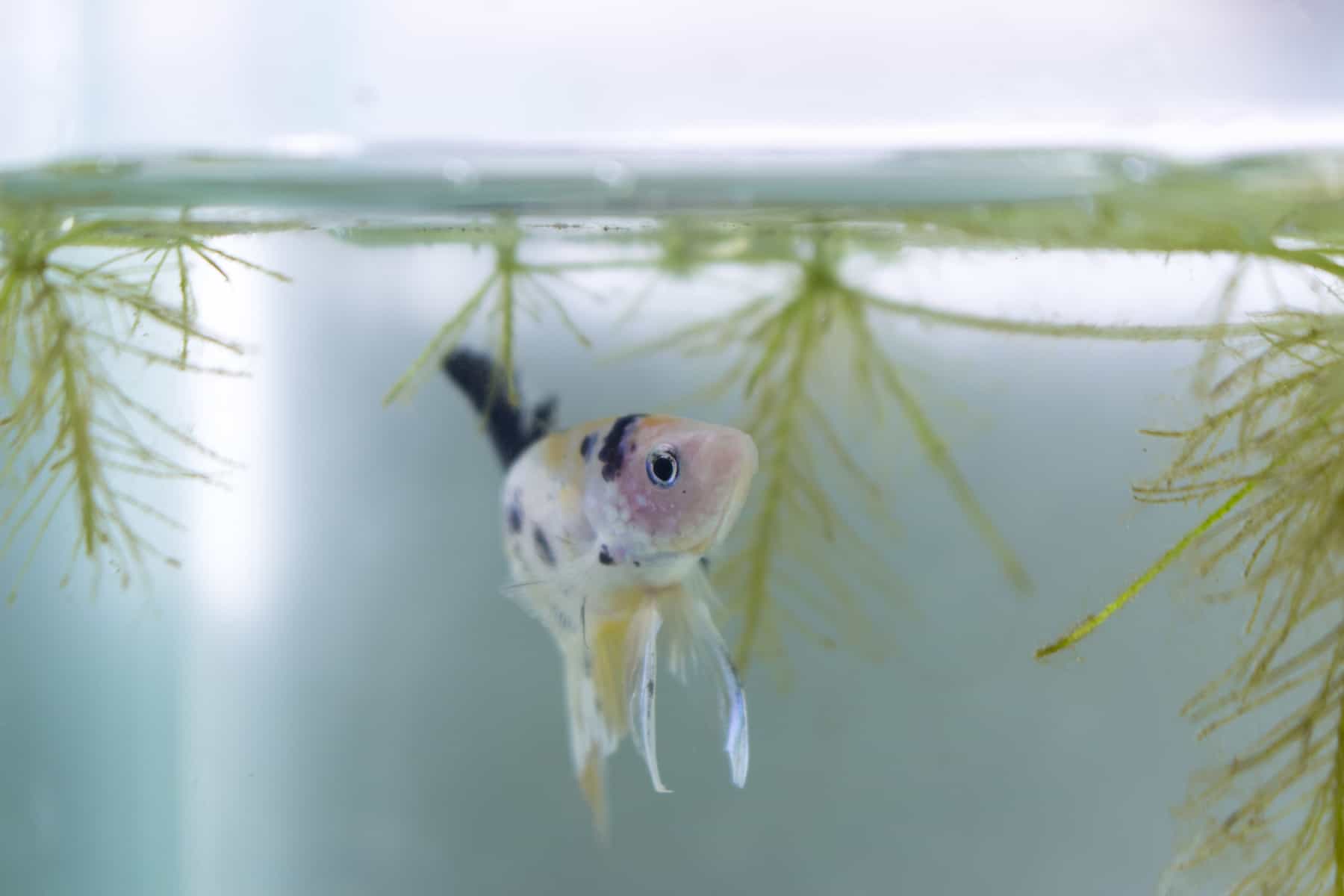Every experienced fishkeeper knows that all coldwater and tropical fish species need specific water conditions if they are to thrive and remain in excellent health. Betta fish are very sensitive to the quality of the water in their tank, so you must get it right.
In this comprehensive guide, we tell you everything you need to know about what kind of water your betta fish needs and how to keep your fishy friend’s environment perfect for him.
Key Takeaways
- Select the Right Conditioner: The success of a betta aquarium begins with properly conditioned tap water. It’s vital to choose a tap water conditioner that effectively neutralizes both chlorine and the more persistent chloramine.
- Maintain Ideal pH: Betta fish require a specific pH range (6.5 to 7.5), so regular monitoring and adjustments are necessary for their well-being. Complete water conditioners and proper filtration support stable pH levels.
- Mix Water Wisely: Exploring water sources like rainwater or spring water is an option. However, they must be carefully balanced with conditioned tap water to achieve the necessary nutrient and mineral levels for a betta-friendly environment.
Betta Water Requirements – At a Glance
| Water Source | Considerations | Treatment Needed |
|---|---|---|
| Tap Water | Contains chemicals like chlorine and chloramine. | You must use a water conditioner to neutralize chemicals before adding them to the tank. |
| Rainwater | It might be free of chemicals but has no buffering capacity and is soft. | Mix with conditioned tap water; monitor pH and hardness closely. |
| Spring Water | Free of chlorine but contains minerals; expensive. | Check pH levels; may require pH adjustments; use a stress coat booster. |
| Distilled Water | Lacks minerals and nutrients; too pure for bettas. | You must add nutrients, minerals, and pH-balancing chemicals before use. |
| Betta-specific Water | Pre-conditioned for bettas; can be expensive. | Ready to use directly but may not be cost-effective for large tanks. |
| Well Water | It could contain heavy metals or pesticides. | Test before use; treat with appropriate conditioners if needed. |
| General Water Quality | pH levels should be 6.5 to 7.5; clean water is critical. | Use complete water conditioners, maintain filtration, and have live plants. |
Types of Water
Although you might look at water and see a colorless, odorless liquid, different kinds of water are not all the same, and you must use the correct type of water for your fish tank. Using the wrong type of water could poison your pet!
So, let’s take a look at the different kinds of water that are available in more detail.
Tap Water
The water that most fish keepers use comes right out of your faucet! However, you must not use tap water in your fish tank without conditioning the water first.
How so?
Well, tap water is chemically treated by your local water utilities company to kill off any bacteria that might be present, making it safe for you to drink and use for washing, etc.
Chlorine vs. Chloramine
Back in the day, chlorine was the chemical disinfectant of choice for most public water companies. To make the water safe for use in your fish tank, all you had to do was run a bucket of tap water, allow it to stand for 24 hours, and stir it occasionally. Chlorine is a pretty unstable substance that evaporates after 24 hours or so, leaving the bucket of water safe for your fish.
I remember when I was given my first fish tank for my fifteenth birthday, dechlorinators hadn’t appeared on the shelves of my local pet store. So, I always used the stand-and-stir method to make the water safe for my community tank, and that worked fine.
However, in recent years, another more stable chemical called chloramine has replaced chlorine in the domestic water supply. Chloramine is made up of both ammonia and chlorine. The ammonia molecules that are bound to the chlorine molecules prevent the chlorine from evaporating. That’s great for killing bacteria and renders the water perfectly safe for you, but it also means that the old-style stand-and-stir technique for tap water purification doesn’t work.
What’s in Your Tap Water?
You might think you know what’s in your tap water, but wait!
Based on Reddit contributor I-study-birds‘ experience, tap water can be incredibly unsafe for use in fish tanks:
“Just adding on my experience: this was terrible advice for me. My LFS told me to stop buying spring water and distilled water to mix since the tap water in the area was fine. I use my API test kit, and everything came back normal, so I figured that was it! 8 months later and I have raging algae issues and a pH of 8.6 that won’t go down no matter how much buffer I add or water changes I do. Turns out, our incredibly hard water raised the KH and GH so much that our pH went up. And our local water has phosphates that are off the chart. So I’ve spent the last few months buying distilled water to do distilled water changes to get everything back to normal and it’s finally working.
But yeah, be cautious about your tap water. Test it on more than just ammonia, nitrites, and nitrates. Look at total dissolved solids and phosphates at least.”
To find out what chemicals and heavy metals your tap water contains, you can either test the water yourself, using an aquarium water testing kit, or ask your local authority to disclose that information. In the U.S., it’s a legal requirement that the water company tell its customers what’s in the water it supplies, so they will tell you if you ask them.
Tap Water Conditioner
To make tap water safe for use in your aquarium, you must add a tap water conditioner to your bucket of water before you add it to your betta’s tank.
Conditioners work by neutralizing the chlorine in the water. However, if the water contains chloramine, you need a specific conditioner that splits the chlorine and ammonia bond and tackles each in isolation. Unfortunately, water companies often alternate between using chloramine and chlorine.
So, I advise using a water conditioner that can handle both.
Dechlorinators
Dechlorinators contain a substance called sodium thiosulfate that eliminates chlorine. However, those products are not effective on tap water that contains chloramine. That’s because, having removed the chlorine from the water, you’re left with a bucket of water that’s full of ammonia, which is potentially lethal to your betta.
Chloramine Neutralizers
Chloramine neutralizers are recommended for use on tap water that’s destined for your betta’s tank. These conditioners can deal with chlorine, ammonia, and heavy metals, providing a good all-round solution to the most common tap water chemical additives.
As well as neutralizing chlorine, chloramine neutralizers convert ammonia to harmless ammonium.
Ammonia Testing Kits
If you have an ammonia test kit, make sure that it only tests for NH3 (ammonia). Some kits also show that the tank water contains NH4, which is harmless ammonium, giving you a false reading.
Complete Water Conditioning Products
A good choice for your betta tank is a complete water conditioning product. Complete conditioners contain chemicals that will tackle chlorine, ammonia, copper, and heavy metals. These products also work as pH buffers and contain additives that can boost your betta’s protective slime coat too.
Tap Water Benefits
So, tap water is readily available, cheap, and contains certain minerals and nutrients that betta fishes need to thrive. Also, cold and hot tap water can easily be mixed so that it’s the ideal water temperature for your betta’s tank.
Rainwater
If you have a rainwater butt in your backyard, you might wonder if you can use that water for your betta’s aquarium. Rainwater is natural, contains no chemical additives, and is just about as pure as your water gets, right? After all, rainwater is what fills the rice paddies of the Siamese Fighting fish’s natural habitat.
Well, you can use rainwater in your betta’s tank, but there are a few things that you need to know before you do.
- Rainwater doesn’t generally contain many airborne pollutants, but that depends on where you live. For example, In the U.S., the rainwater is mostly clean.
- Rainwater is mildly acidic and has no chemicals to buffer the pH.
- Rainwater hardness (total dissolved solids, TDS) is close to zero.
Wild bettas live in water that typically has a TDS of almost zero and a pH level of 5 or less. So, your pet could theoretically live in pure rainwater. Alternatively, you could mix pure rainwater with 5% or 10% tap water, although you will still condition the tap water before you use it.
That said, you will need to monitor your tank water because the pH can drop too low, as rainwater has no buffering capacity. You must also measure the water hardness and carbonate hardness to make sure that they are both in line with levels that your betta can tolerate.
To play it safe, begin by using 25% rainwater and make up the difference with tap water. Provided that the pH remains between 6.5 and 7.5, you can increase the mix to 50% rainwater. Monitor the water, and if the pH level drops, reduce the rainwater content.
Springwater
If you fancy treating your betta to a luxury kind of water, you might consider using bottled spring water. Bottled spring water doesn’t contain chlorine or any other nasty chemicals, although it does have some mineral content, so you would need to check the pH levels are safe for your betta at around 6.5 to 7.5. Also, if you use spring water for your betta fish, I recommend that you use a stress coat booster.
Although bottled water can make a good alternative to tap water for use in a betta tank, it can work out expensive. You should only use still water, not the carbonated, sparkling variety!
Distilled Water
Distilled water is processed to remove all minerals, chemicals, and nutrients. So, essentially, all you’re left with is pure water.
Although purified water can be useful for many purposes, it is not suitable for use in your betta fish tank unless you add nutrients, minerals, and pH-balancing chemicals. If you fail to do that, your betta will not thrive, and he could even die.
Betta-Specific Water
Some fish stores sell water that’s advertised as being specifically for use with betta fish. That bottled water has been pre-conditioned to make it perfect for use in betta habitats.
The pH is ideal for betta fish, and all harmful chemicals and heavy metals have been removed. Although this water is perfect for your pet, it’s usually costly, making it impractical for use in larger tanks.
However, if you have a small betta aquarium, you might appreciate the convenience of having water that’s ready for immediate use.
Well Water
If you live in a rural area that’s not part of the city grid water supply, you might get your water from a well. But is well water safe to use in your betta’s tank?
Although well water doesn’t contain chlorine or chloramine unless you’re adding them to make the water safe to drink, well water can sometimes have heavy metals such as iron or copper, and fertilizer or pesticide residue can also be present.
You can check if your well water is safe for use in your betta tank by taking a sample to your local fish store, which will test it for you. Once you know what’s in the well water, you can choose a suitable conditioner to treat it with. Also, you’ll need to check that the pH levels are appropriate for your betta pet, and you can do that by using an aquarium water testing kit.
Water pH Levels
A critical aspect of creating a perfect watery home for your betta pet is to get the water parameters correct, especially the pH.
Betta fish water should ideally have a pH in the range of 6.5 to 8.0. However, they can tolerate slightly acidic water if you adjust gradually. Water generally maintains a pH of close to 7.0, which is classed as “neutral.” However, in the case of bottled water, the pH can be between as low as 6.0 and as high as 9.0.
You must test the water pH before you put it into your betta tank. If necessary, you can add a pH buffer chemical to correct the levels. pH levels increase in line with the levels of dirt and debris in the tank. So, if you keep your water clean, maintain your filtration system, and carry out regular partial water changes, the pH level in your betta fish tank should remain relatively stable.
Filtration
To maintain optimal water quality for your betta fish, you must install an efficient filter system in your pet’s tank.
The filter system removes fish waste and harmful chemicals like ammonia and nitrites from the water and keeps nitrate levels down, rendering the water safe for your fish. You must clean and maintain the filter media and filter unit properly to keep it running correctly, but that’s not a big job and won’t take you long in a small betta tank.
Plants
All types of fish, including bettas, love plants in their habitat, and I always include a range of different plant species in my tanks. Your betta fish will enjoy relaxing and resting on flat-leaved plants, hiding in bushy plant clumps, and building bubble nests beneath floating species.
As a bonus, plants use nitrates as fertilizers, absorbing those harmful chemicals from the water and helping to make it safe. Plants also take up carbon dioxide and release oxygen, keeping the tank well-oxygenated for your betta fish.
You’ll need to provide adequate light for the plants you choose, and some species require root tabs or liquid fertilizer supplements to keep them healthy.
In Conclusion
Betta fish need clean water with a pH between 6.5 and 7.5.
Although you can buy specially prepared betta water, the best kind of water to use for a betta fish tank is tap water that’s been treated with a suitable conditioner that neutralizes the chemicals, heavy metals, and copper that may be present in the water. Tap water is cheap, readily available, and contains some of the minerals that bettas need to remain healthy.
To find out exactly what chemicals are in your tap water, ask your local water supply company to disclose that information to you so that you know what kind of water conditioner to use.












